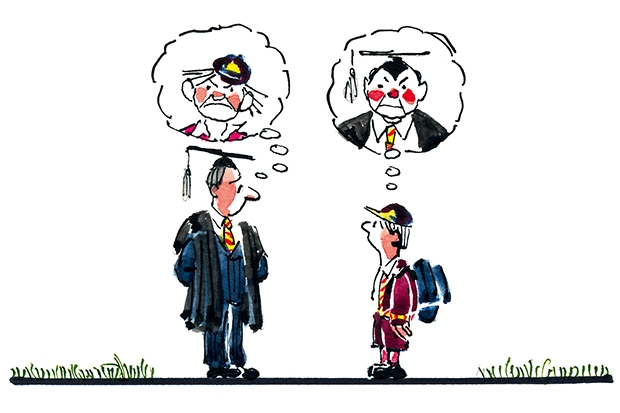Bedales. A school known for its lack of uniform and its policy of pupils calling their teachers by their first names, it is beloved by some but baffles others. To add to the confusion, its headmaster isn’t the happy-clappy chap you might expect. ‘I’m far from being some kind of trendy character,’ insists Keith Budge, who describes himself as ‘Celtic fringe — half Scots, half Welsh’. Budge — I should probably refer to him as Keith, since his students do — has been the headmaster of the Hampshire school since 2001. ‘I’m just liberal in the sense of wanting education to offer the individual as much freedom as it possibly can,’ he says.
Bedales certainly does this. The students don’t wear uniforms (these disappeared in the 1960s) and the teachers have gone by their first names since it caught on during a camping trip in the 1930s. They also don’t do normal GCSEs, and there’s no prefect system. Is Bedales the anti-public school?
Budge — or rather, Keith — isn’t sure. ‘Well, we’re an independent boarding school, so we have more in common with Marlborough or Eastbourne than we do with the maintained sector,’ he says.
But given that the Victorian visionary John Badley established Bedales in 1893 ‘in order to do things that his own school, Rugby, hadn’t been able to do’, there’s a suggestion that it might well be. Although Rugby had been reformed by Thomas Arnold, Badley’s school ‘mines into a different seam of British national life’, according to Keith. This is the Arts and Crafts Movement — ‘more progressive, with a sort of radical element to it, linking up with the start of Fabianism’. As such, he describes Bedales as ‘tolerant. Teenage communities are not naturally tolerant places … [In the Victorian] public-school context, individuality was deemed a problem. Here, individuality is encouraged institutionally.’ The dress code isn’t an excuse for a fashion show, however. ‘As it happens, people dress as boringly as I do, but that’s their choice.’
The school is also academically open-minded, with its own batch of examinations for pupils to take alongside the compulsory iGCSEs of English, maths, science and a foreign language. These, the Bedales Assessed Courses (BACs), were introduced in 2006, and cover 12 subjects, the more avant-garde among them being global awareness, classical music and outdoor work. They were designed, Keith says, ‘in order to cherish independent thought’. In other words: additional subjects taken at GCSE level shouldn’t be limited to geography and history.
It all sounds very ambitious. What did ‘the blob’ make of this? I ask, referring to Michael Gove’s term for the bureaucrats and academics whom he blamed for getting in the way of his shake-up of the education system. ‘The so-called blob was not a factor. Schools in the independent sector imagine that there are more constraints placed on them with the curriculum than there are.’
In fact the process was relatively straightforward. Having devised the outline of a plan, he consulted with universities to find out whether they would be open to taking students with these new qualifications. When they said that it would not affect applicants’ chances either way, he ‘pressed a button’.
Keith himself attended Rossall School in Lancashire before reading English at University College, Oxford. Before Bedales, he taught at Eastbourne College, Marlborough and then Loretto, where he introduced coeducation. Uniform aside, what’s the difference between Bedales and these schools? ‘The traditional public schools are more explicitly structured. Bedales is carefully structured, but the purpose of the structure is to keep the structure hidden, and to give the students a sense that they live uncluttered lives.’ The school is also light on ritual and hierarchy. Unlike at some public schools, which require a handbook to be able to understand the jargon, Keith says that there’s nothing of the sort at Bedales. ‘The tendency of school hierarchies [is] to operate to keep people in their place. Very little of that happens here.’
Talking of level playing fields, Keith says the idea put forward by Conservative politician Matthew Hancock to make employers find out where job applicants were educated was ‘a classic bit of gesture politics. It doesn’t mean anything, does it?’ With parents paying £33,000 a year to send their children to board at Bedales, he must be diplomatic. ‘What’s important is that young people applying for jobs are judged on their merits, not on any sort of assumptions.’
Bryanston is often seen as Bedales’ closest rival, he says. Yet he contends that the latter is a ‘conviction-led’ school, like the highly academic Winchester College, Eton and Ampleforth. ‘They’re all highly distinctive schools with very strong “brands”. It’s to do with the clarity of vision, and an adherence to that vision.’ If there’s one way to describe Bedales, it is highly distinctive.






Comments